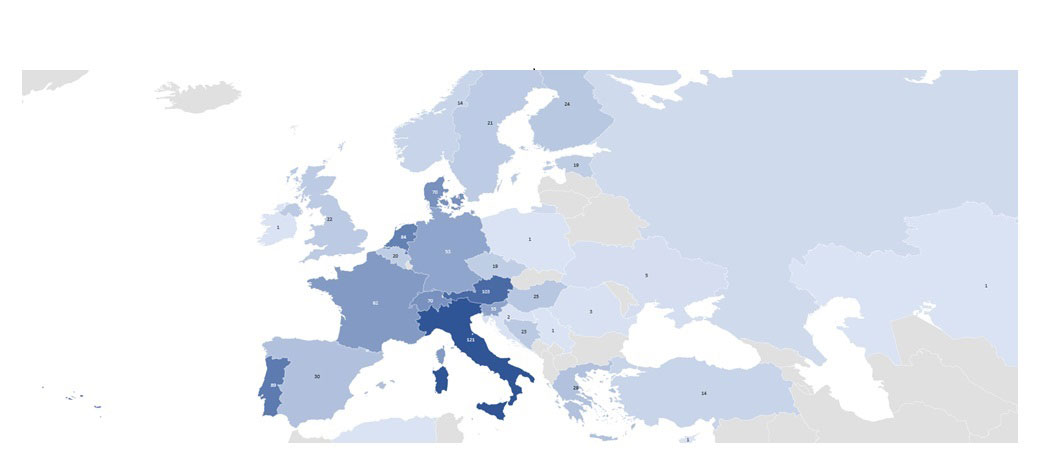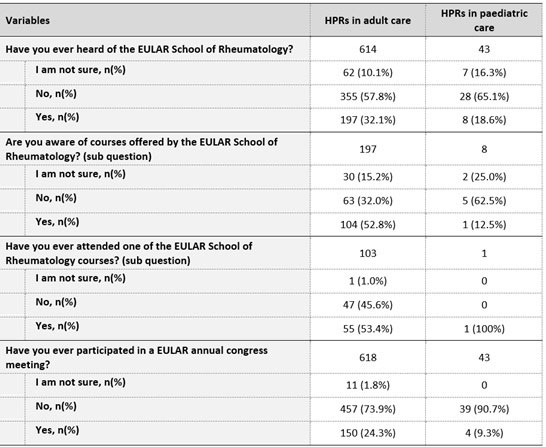Session Information
Session Type: Poster Session B
Session Time: 9:00AM-10:30AM
Background/Purpose: Health professionals in rheumatology (HPRs) should participate in post-graduate or continuous education to update and advance their knowledge and skills. This can improve patient outcomes and increase quality of care.1 EULAR aims to become a leading provider of postgraduate education for HPRs. The aims of this study were to evaluate the current motivations for participating in postgraduate education of HPRs, identify barriers and facilitators for participation in postgraduate education, and evaluate participation in the current educational offerings of EULAR for HPRs across Europe.
Methods: An online survey was developed and distributed in collaboration with the EULAR Standing Committee of Education and Training (ESCET) and the Paediatric Rheumatology European Society (PReS). The questionnaire was translated by national HPR representatives in 24 languages to cover the 25 national member organisations. Barriers were assessed using 5-point Likert scales, higher scores representing higher barriers. Quantitative data were analysed using descriptive statistics. In addition, we ran the Latent Dirichlet Allocation (LDA) on the answers to the open questions. LDA is an unsupervised probabilistic topic modelling technique that extracts the meanings of a pre-defined number of topics. Design of the survey and reporting of results were done according to the Checklist for Reporting Results of Internet E-Surveys (CHERRIES).
Results: The online questionnaire was accessed 3,589 times but only 667 complete responses were recorded. HPRs from 34 European countries responded to the survey; 80% of whom were women. The highest-ranked educational need was prevention, including lifestyle interventions and professional development. Although EULAR was well known among HPRs, only 32.1% of HPRs in adult care and 18.6% of HPRs in paediatric care have ever heard of the EULAR School of Rheumatology (Table A). The main barriers to participation in EULAR’s educational offerings were identified by HPRs in adult care and in paediatric care (respectively) as: the unfamiliarity with the course content (3.48 [±1.50]; 3.92 [±1.46]), the associated costs (3.44 [±1.35]; 3.69 [±1.28]) and English language (2.59 [±1.50]; 2.80 [±1.34]).
Conclusion: EULAR is well-known by HPRs in Europe, however, awareness of educational offerings is low and barriers to participation are numerous. To become the leading provider of postgraduate training by 2023, EULAR could use a “franchise” model that can be tailored to local conditions. This could be achieved by strengthening national organizations by actively involving them in the development of training programs and disseminating these programs and offerings through their networks.
To cite this abstract in AMA style:
Sperl L, Stamm T, Andrews M, Bjork M, Boström C, Cappon J, de la Torre J, de Thurah A, Domján A, Dragoi R, Estévez-López F, Ferreira R, Fragoulis G, Grygielska J, Kõrve K, Kukkurainen M, Madelaine-Bonjour C, Marques A, Meesters J, Moe R, Moholt E, Mosor E, Naimer-Stach C, Ndosi M, Pchelnikova P, Primdahl J, Putrik P, Rausch-Osthoff A, Smucrova H, Testa M, van Bodegom L, Peter W, Zangi H, Zimba O, Vliet Vlieland T, Ritschl V. Educational Needs Among Health Professionals in Rheumatology: Low Awareness of EULAR Offerings and Unfamiliarity with Course Content as a Major Barrier – a EULAR Funded European Survey [abstract]. Arthritis Rheumatol. 2022; 74 (suppl 9). https://acrabstracts.org/abstract/educational-needs-among-health-professionals-in-rheumatology-low-awareness-of-eular-offerings-and-unfamiliarity-with-course-content-as-a-major-barrier-a-eular-funded-european-survey/. Accessed .« Back to ACR Convergence 2022
ACR Meeting Abstracts - https://acrabstracts.org/abstract/educational-needs-among-health-professionals-in-rheumatology-low-awareness-of-eular-offerings-and-unfamiliarity-with-course-content-as-a-major-barrier-a-eular-funded-european-survey/


